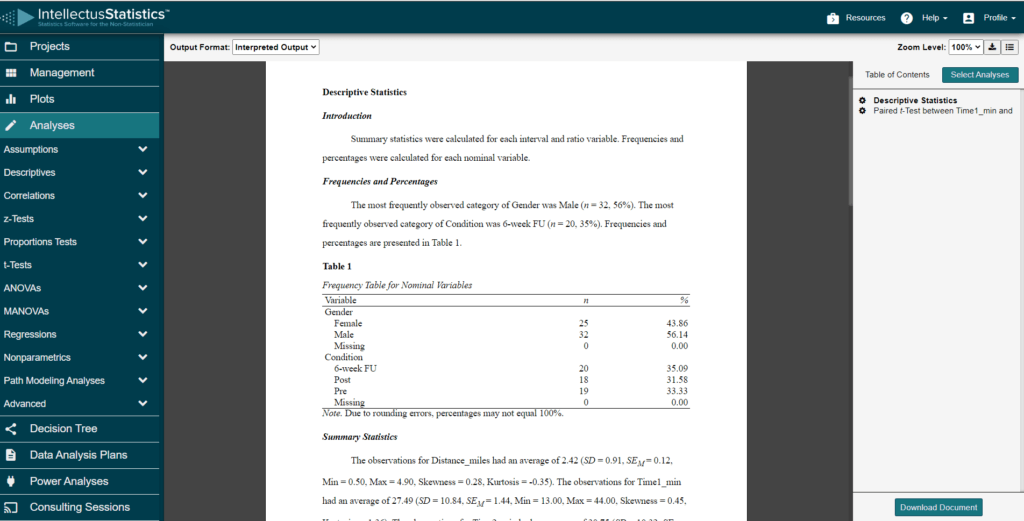Statistics Software for the Non-Statistician
The Intellectus Statistics software is specifically designed to empower individuals with limited statistical training to effectively conduct statistical analyses and effectively communicate their results. Our goal is to enable these individuals to advance their organizations, forward their careers, and benefit their communities through the acquisition of statistical skills.
We serve a diverse range of individuals, including underprepared community college students, undergrads, non-statistician administrators, professional doctorate students, and R1 researchers who lack the time, courses or access to appropriate data analysis tools. Our aim is to make the process of learning, data analysis, and results presentation as simple and intuitive as possible for these groups.
We are passionate about assisting these niche groups and are committed to providing them with the necessary tools and resources to advance their personal and professional lives, and positively impact the lives of others.
To achieve our mission, we employ a team of dedicated and highly skilled individuals, who are committed to creating and supporting our helpful products for millions of higher education students in the US, Canada, and other countries around the world. We are confident that the expertise and effort of our staff will enable us to achieve our goal of empowering individuals with limited statistical training to effectively conduct statistical analyses and communicate their results.

Developing an All-Inclusive Statistical Analysis Tool and Course: Considering the Needs of Students, Faculty, and Departments
When developing the Intellectus tool and course, we took a holistic approach that considered the perspectives and needs of three key stakeholders: students, faculty, and the department. To achieve this, we conducted extensive research to gain a thorough understanding of the following factors:
Students’ preparation levels and economic constraints, including the types of statistical training they have received and the resources they have access to.
Faculty time-sink activities, such as the amount of time spent providing guidance to students, and their publication needs, including the need for polished and professional presentations of research results.
The focus and priorities of the department, including the types of research they conduct, the statistical techniques they use most frequently, and their objectives in terms of student learning and success.
This comprehensive approach allowed us to create a tool and course that effectively addresses the needs and challenges faced by each of these key stakeholders. By understanding the perspectives and needs of students, faculty, and the department, we were able to develop a solution that is tailored to meet their unique requirements and promotes the efficient and effective conduct of statistical analyses, interpretation, and presentation of results.
Student's Prep
The ability of students to learn and understand statistics can be hindered by a variety of factors, including a lack of mathematical preparation and programming experience. This is a common issue, particularly among students who have not been exposed to the traditional methods of teaching statistics. Furthermore, these challenges are exacerbated by the growing economic pressures faced by students, including the rising costs of tuition and fees, as well as the high cost of textbooks.
According to data from the National Center for Education Statistics, tuition and fees have increased by 10% to 19% from 2010-2011 to 2020-2021, putting significant financial pressures on students. This, combined with the high cost of textbooks, can exacerbate the difficulties faced by students who are already underprepared in terms of their mathematical and programming skills.
In light of these challenges, it is important for those involved in the teaching and learning of statistics to take a holistic approach that addresses the unique needs and constraints of students. This includes not only understanding the limitations of their mathematical and programming background but also considering the economic pressures and resource constraints faced by students. By taking these factors into account, educators can develop a more effective and inclusive approach to teaching statistics, one that addresses the unique needs of underprepared and under-resourced students.
Faculty Time-Sink
The process of assisting students with their research can be a significant time commitment for faculty, particularly when it comes to ensuring that analyses are conducted accurately and that results are properly interpreted. This time commitment, known as a “time-sink” in the academic community, can negatively impact faculty members’ own research demands and productivity.
Intellectus Statistics addresses this challenge by providing a comprehensive and user-friendly tool and course that streamlines the process of conducting analyses and publishing research. The solution’s advanced AI like drafting technology enables the rapid and accurate interpretation of data and produces nearly print-ready output drafts, reducing the time and effort required for faculty to assist students with their research.
Additionally, Intellectus’ interactive analysis selection feature, power analyses help, and its data management tools with context-sensitive help, enable the user to efficiently conduct their statistical analysis. The power analyses tools assist them in selecting the appropriate sample size for their analysis. This allows faculty members to spend less time providing guidance to students and more time focusing on their own research, thus reducing the impact of the time-sink, and facilitating the publication of research in a timely manner.
In summary, Intellectus Statistics addresses the challenge of the faculty time-sink by providing a user-friendly tool and course that streamlines the process of conducting analyses and publishing research. By reducing the time and effort required for faculty to assist students with their research, it allows faculty members to focus more on their own research, thus reducing the time-sink and facilitating the publication of research in a timely manner.
Department Focus
The focus of academic departments and disciplines can vary greatly, with some being practitioner-focused and others being research-focused. Given this diversity of focus, the time and resources allocated to research activities can also vary greatly among institutions. For example, departments in practitioner-focused institutions may have less time and resources to devote to research than those in research-focused institutions, such as R1 institutions.
It is important to note that even within R1 institutions, where research is a primary focus, there can be a challenge of having too much data and not enough time to analyze it. This is where Intellectus statistics can play an important role in providing a user-friendly, efficient, and comprehensive tool to conduct, interpret, and present the research. It will not only help the researcher but also assist the departments with limited time and resources for research to streamline the process and make use of their resources effectively.
In conclusion, Intellectus Statistics takes into consideration the diverse focus of academic departments and disciplines, and provides a solution that is tailored to meet the unique needs of each department. It is particularly beneficial for departments with limited time and resources for research, providing a user-friendly, efficient, and comprehensive tool to conduct, interpret, and present the research, allowing them to make the most of their resources and focus on their primary goals.
Our Mission
The mission of Intellectus Statistics is to provide a comprehensive and user-friendly solution for the teaching of statistics and the supervision of student research. Our goal is to empower instructors and mentors with the tools and resources they need to effectively teach statistics and guide student research, while also providing students with a platform that facilitates their learning, performance, and communication of statistical findings.
To achieve this mission, we utilize a combination of cutting-edge technologies, including R statistics packages, Amazon servers for scalability, browser-based accessibility, industry-standard encryption security, and engaging courses. Our approach is guided by the principles of ease-of-use, usability, and efficiency. We strive to make the process of conducting statistical analyses, interpreting results, and presenting findings as straightforward and intuitive as possible, while also ensuring that our solution is secure and easily accessible to users.
We firmly believe that our mission is closely aligned with the needs and challenges faced by instructors, mentors, students, and faculty, and we are committed to constantly refining and improving our solution to better meet these needs. We are dedicated to leveraging the latest technologies to make the process of conducting statistical analyses and communicating research findings more efficient and user-friendly, while also ensuring that our solution is secure and scalable. In this way, we hope to empower users to learn, perform, and communicate their statistical findings, thus achieving our mission of supporting instructors, mentors, students and, faculty more easily.
Upload Data
Data can be uploaded from SPSS, Excel, or entered directly.
Select your analysis
The Decision Tree assists in selecting the appropriate analysis, or go straight to the analysis tab to choose from over 50 statistical tests.
Conduct and interpret analysis
Intellectus analyzes your data, pre-loads the assumptions, and even provides the non-parametric equivalent test when assumptions are violated.
AI like drafting technology
Interpreted output presented in plain English and formatted with APA 7th edition tables and figures.
Make it your own
Edit the draft.
Submit results
Submit edited results with confidence to instructor, committee, division leader, or journal.
Benefits
The Intellectus Statistics solution offers a range of benefits for users across various levels of experience and expertise. By providing a comprehensive and user-friendly platform for conducting statistical analyses and interpreting results, we aim to empower our users to complete their research and benefit their institutions and communities more effectively and efficiently.
For graduate students, the use of the Intellectus Statistics solution allows them to independently perform analyses and report findings, thereby reducing their reliance on faculty guidance and facilitating the completion of their dissertations and theses. Undergraduates, on the other hand, can develop their quantitative reasoning skills and understanding of statistical methods, thereby equipping them with the skills necessary to succeed in graduate-level research.
In addition to students, the Intellectus Statistics solution is highly beneficial for researchers and administrators in R1 institutions, enabling them to save time and more effectively conduct and communicate their research. The automation of data analysis and report generation, context-sensitive help, and interactive analysis selection allows researchers to efficiently conduct analysis and interpret results which they can share to the community.
In summary, the Intellectus Statistics solution offers a range of benefits for users across various levels of experience and expertise, including graduate students, undergraduates, researchers, and administrators. By providing a comprehensive and user-friendly platform for conducting statistical analyses and interpreting results, we aim to empower our users to complete their research and benefit their institutions and communities more effectively and efficiently.

"Intellectus Statistics has been an incredibly valuable resource. I find the easy to follow explanations of each specific statistical test utilized to be extremely beneficial for my graduate students as they move from data collection to data analysis."
John P. Maye, PhD, CRNA
Professor/Pain Management Education Coordinator, USF College of Nursing
Learn more about Intellectus Statistics
We’d love to introduce you to Intellectus, and show you how our innovative statistical platform will benefit your organization. So, take a few moments to request more information, and a customer success representative will reach out to you to schedule a demo.